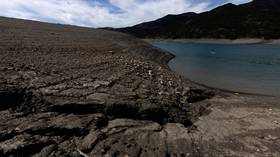EU drought ‘worst in 500 years’

Europe is experiencing what appears to be the worst drought in five centuries, the European Commission warned on Tuesday, citing a new analysis released by the EU’s Joint Research Center (JRC).
The August report highlighted the continued impact of extreme weather on farming. Almost half of the EU, or 47%, remains under warning conditions due to a shortage of moisture in the soil, while 17% of the EU is on alert due to the negative effects the weather has on crops. Together, they constitute 64% of the EU, the statement pointed out.
The scientists predict a decline in summer crop yields due to the extreme conditions, with the performance of grain maize, sunflower, and soybean farms hit the worst and dropping by 16%, 15%, and 12%, respectively. There is, however, a silver lining in that winter crops saw somewhat better yields, the JRC said.
“According to JRC experts, the current drought still appears to be the worst since at least 500 years. Final data at the end of the season will confirm this preliminary assessment,” the commission said.
European Commissioner for Innovation, Research, Culture, Education and Youth Mariya Gabriel said the combination of severe drought and heat waves created “unprecedented stress” on water levels across the entire EU.
“We are currently noticing a wildfires season sensibly above the average and an important impact on crops production,” she said.
The impact goes beyond the agriculture sector, since shallow European rivers cannot generate as much hydropower, provide as much cooling for industrial plants or serve as transport lines as well as they would under normal circumstances, the statement added.












